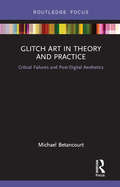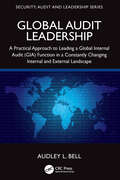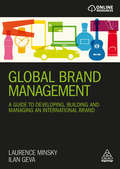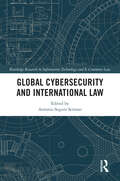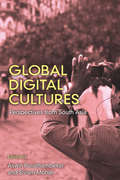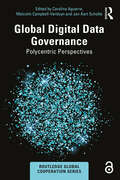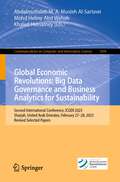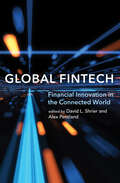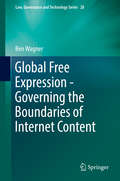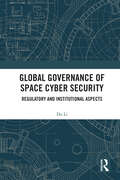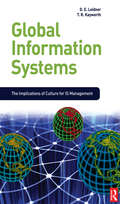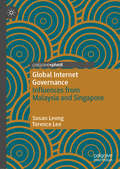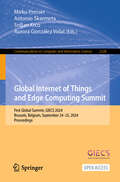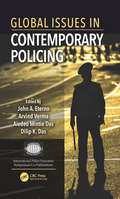- Table View
- List View
Glencoe Keyboarding with Computer Applications
by McGraw-HillMicrosoft Word 2007 is a powerful word processing program. Using this program, you can create documents that contain tables, artwork, and decorative fonts.
Glencoe Mechanical Drawing: Board and CAD Techniques
by Glencoe McGraw-Hill StaffProject-based learning prepares students for professional certification with Glencoe Mechanical Drawing: Board and CAD Techniques! Endorsed by the American Design Drafting Association (ADDA), this text includes Prep for ADDA activities. Step-by-step applications, design problems, and drafting problems prepare students for professional excellence and certification. Project-based learning is supported with unit-based projects that integrate technical math and culminate in Build Your Portfolio activities. Help your students get ready for competitive events like the TSA and SkillsUSA with prep activities embedded throughout the content and end-of-chapter assessments. Rigorous academic content is supported, with a special emphasis on math, geometry, and science, with STEM activities. Point-of-use correlations ease possible academic credit application. Extra activities in the Student Edition and workbook help you meet Perkins mandates. The appendix features Math (including algebra and geometry), abbreviations and symbols, pipe symbols, and reference tables (ASME, ANSI, ISO).
Glide-Symmetric Z2 Magnetic Topological Crystalline Insulators (Springer Theses)
by Heejae KimThis book presents a comprehensive theory on glide-symmetric topological crystalline insulators. Beginning with developing a theory of topological phase transitions between a topological and trivial phase, it derives a formula for topological invariance in a glide-symmetric topological phase when inversion symmetry is added into a system. It also shows that the addition of inversion symmetry drastically simplifies the formula, providing insights into this topological phase, and proposes potential implementations. Lastly, based on the above results, the author establishes a way to design topological photonic crystals. Allowing readers to gain a comprehensive understanding of the glide-symmetric topological crystalline insulators, the book offers a way to produce such a topological phase in various physical systems, such as electronic and photonic systems, in the future.
Glitch Art in Theory and Practice: Critical Failures and Post-Digital Aesthetics
by Michael BetancourtGlitch Art in Theory and Practice: Critical Failures and Post-Digital Aesthetics explores the concept of "glitch" alongside contemporary digital political economy to develop a general theory of critical media using glitch as a case study and model, focusing specifically on examples of digital art and aesthetics. While prior literature on glitch practice in visual arts has been divided between historical discussions and social-political analyses, this work provides a rigorous, contemporary theoretical foundation and framework.
Glitch Kingdom
by Sheena BoekwegThe teenage daughter of an executioner and the traitorous prince she can’t kill must reluctantly join forces to dethrone a paranoid queen after discovering they are trapped in a video game in Sheena Boekweg's fast-paced YA debut, Glitch Kingdom...Ryo was the golden boy, the prankster prince, but with one stroke of a pen he has lost everything. Dagney and Grigfen were happy as minor members of the court, but when their father, the king's executioner, is branded a traitor, they each must deal in death in order to survive.. McKenna, queen of the enemy realm, has inherited a mission of conquest by assassination, but worries she's not up to the role. But behind the crowns and masks hides a secret… All of these teens are actually players in the newest, shiniest, most immersive virtual reality video game, competing against each other for a highly coveted internship with a prestigious game developer. But now this life-changing opportunity has suddenly become a deadly trap. A glitch in the software has locked the players inside the game, and they’ll need to escape before the fantasy world corrupts around them. The only way out is to win.
Global Aeronautical Distress and Safety Systems (GADSS): Theory and Applications
by Stojče Dimov IlčevThis book presents the principal structure, networks and applications of the Global Aeronautical Distress and Safety System (GADSS) for enhanced airborne Communication, Navigation and Surveillance (CNS). It shows how their implementation works to ensure better security in flight and on the airports surface; improved aircraft tracking and determination in real space and time; and enhanced distress alerting, safety; and Search and Rescue (SAR) system for missing, hijacked and landed aircraft at sea or on the ground. Main topics of this book are as follows: an overview of radio and satellite systems with retrospective to aeronautical safety; security and distress systems; space segment with all aspects regarding satellite orbits and infrastructures; transmission segment of radio and satellite systems; ground segment of radio and earth ground stations; airborne radio and satellite antenna systems and propagation; aeronautical VHF and HF Radio CNS systems and networks; Inmarsat, Iridium and Cospas-Sasrast aeronautical satellite CNS systems and networks; Aeronautical Global Satellite Augmentation System (GSAS) and networks; Digital Video Broadcasting - Return Channel via Satellite (DVB-RCS) standards and Aeronautical Stratospheric Platform Systems (SPS) and networks.
Global Audit Leadership: A Practical Approach to Leading a Global Internal Audit (GIA) Function in a Constantly Changing Internal and External Landscape (ISSN)
by Audley L. BellLeaders across the globe have a common challenge they cannot ignore: CHANGE. This must be embraced and effectively managed to remain relevant and successful in a dynamic operating environment. Embracing change, including technological innovations, collaboration, and timely sharing of information, is paramount to the survival and success of everyone in an ever-changing environment.In times of rapid change, organizations are often forced to adjust their strategic plans. Stakeholders usually need assistance to effectively manage the risks, unprecedented at times, and to capitalize on the opportunities that usually come with change. Change management must be effectively executed to assist in ensuring the viability of the organization.This book provides advice and guidance to assist stakeholders in navigating the challenges and demands of change. It includes insights, measures, and tools that have contributed to my success as a leader in the internal audit profession for 27 years.
Global Brand Management: A Guide to Developing, Building & Managing an International Brand
by Laurence Minsky Ilan GevaIn today's hyper-connected world, any brand with a website or digital presence is 'global' by its very definition; yet in practice it takes an enormous amount of strategic planning and adaptability to successfully manage an international brand. Global Brand Management explores the increasingly universal scope of brand management. In an era when many brand managers will find themselves working for large multinationals operating across varied territories, categories and consumer groups, developing an understanding of both the opportunities and risks of multinational brands is truly essential. Meticulously researched, Global Brand Management shows readers how to manage an existing global brand, while simultaneously equipping them with the skills to build one from scratch. The text uses fascinating case studies including Oreo, Harley Davidson and Xiaomi to demonstrate the challenges of maintaining a stable brand identity when operating across territories with different languages, cultural values and logistics. With helpful pedagogy throughout and built-in features to enhance classroom learning, Global Brand Management is the perfect springboard for students to appreciate, enjoy and embrace the nuances and complexities of brand management on an international scale.
Global COVID-19 Research and Modeling: A Historical Record (Data Analytics)
by Longbing CaoThis book provides answers to fundamental and challenging questions regarding the global response to COVID-19. It creates a historical record of COVID-19 research conducted over the four years of the pandemic, with a focus on how researchers have responded, quantified, and modeled COVID-19 problems. Since mid-2021, we have diligently monitored and analyzed global scientific efforts in tackling COVID-19. Our comprehensive global endeavor involves collecting, processing, analyzing, and discovering COVID-19 related scientific literature in English since January 2020. This provides insights into how scientists across disciplines and almost every country and regions have fought against COVID-19. Additionally, we explore the quantification of COVID-19 problems and impacts through mathematics, AI, machine learning, data science, epidemiology, and domain knowledge. The book reports findings on publication quantities, impacts, collaborations, and correlations with the economy and infectionsglobally, regionally, and country-wide. These results represent the first and only holistic and systematic studies aimed at scientifically understanding, quantifying, and containing the pandemic. We hope this comprehensive analysis will contribute to better preparedness, response, and management of future emergencies and inspire further research in infectious diseases. The book also serves as a valuable resource for research policy, funding management authorities, researchers, policy makers, and funding bodies involved in infectious disease management, public health, and emergency resilience.
Global Cybersecurity and International Law (Routledge Research in Information Technology and E-Commerce Law)
by Antonio Segura SerranoThis book offers a critical analysis of cybersecurity from a legal-international point of view.Assessing the need to regulate cyberspace has triggered the re-emergence of new primary norms. This book evaluates the ability of existing international law to address the threat and use of force in cyberspace, redefining cyberwar and cyberpeace for the era of the Internet of Things. Covering critical issues such as the growing scourge of economic cyberespionage, international co-operation to fight cybercrime, the use of foreign policy instruments in cyber diplomacy, it also looks at state backed malicious cyberoperations, and the protection of human rights against State security activities. Offering a holistic examination of the ability of public international law, the book addresses the most pressing issues in global cybersecurity.Reflecting on the reforms necessary from international institutions, like the United Nations, the European Union, the Council of Europe, and NATO, in order to provide new answers to the critical issues in global cybersecurity and international law, this book will be of interest to academics, students and practitioners.
Global Data Protection in the Field of Law Enforcement: An EU Perspective (Routledge Research in EU Law)
by Cristina Blasi CasagranThis study examines a key aspect of regulatory policy in the field of data protection, namely the frameworks governing the sharing of data for law enforcement purposes, both within the EU and between the EU and the US and other third party countries. The work features a thorough analysis of the main data-sharing instruments that have been used by law enforcement agencies and the intelligence services in the EU and in the US between 2001 to 2015. The study also explores the challenges to data protection which the current frameworks create, and explores the possible responses to those challenges at both EU and global levels. In offering a full overview of the current EU data-sharing instruments and their data protection rules, this book will be of significant benefit to scholars and policymakers working in areas related to privacy, data protection, national security and EU external relations.
Global Digital Cultures: Perspectives from South Asia
by Aswin Punathambekar Sriram MohanDigital media histories are part of a global network, and South Asia is a key nexus in shaping the trajectory of digital media in the twenty-first century. Digital platforms like Facebook, WhatsApp, and others are deeply embedded in the daily lives of millions of people around the world, shaping how people engage with others as kin, as citizens, and as consumers. Moving away from Anglo-American and strictly national frameworks, the essays in this book explore the intersections of local, national, regional, and global forces that shape contemporary digital culture(s) in regions like South Asia: the rise of digital and mobile media technologies, the ongoing transformation of established media industries, and emergent forms of digital media practice and use that are reconfiguring sociocultural, political, and economic terrains across the Indian subcontinent. From massive state-driven digital identity projects and YouTube censorship to Tinder and dating culture, from Twitter and primetime television to Facebook and political rumors, Global Digital Cultures focuses on enduring concerns of representation, identity, and power while grappling with algorithmic curation and data-driven processes of production, circulation, and consumption.
Global Digital Data Governance: Polycentric Perspectives (Routledge Global Cooperation Series)
by Jan Aart Scholte Malcolm Campbell-Verduyn Carolina AguerreThis book provides a nuanced exploration of contemporary digital data governance, highlighting the importance of cooperation across sectors and disciplines in order to adapt to a rapidly evolving technological landscape. Most of the theory around global digital data governance remains scattered and focused on specific actors, norms, processes, or disciplinary approaches. This book argues for a polycentric approach, allowing readers to consider the issue across multiple disciplines and scales. Polycentrism, this book argues, provides a set of lenses that tie together the variety of actors, issues, and processes intertwined in digital data governance at subnational, national, regional, and global levels. Firstly, this approach uncovers the complex array of power centers and connections in digital data governance. Secondly, polycentric perspectives bridge disciplinary divides, challenging assumptions and drawing together a growing range of insights about the complexities of digital data governance. Bringing together a wide range of case studies, this book draws out key insights and policy recommendations for how digital data governance occurs and how it might occur differently. Written by an international and interdisciplinary team, this book will be of interest to students and scholars in the field of development studies, political science, international relations, global studies, science and technology studies, sociology, and media and communication studies.
Global Economic Revolutions: Second International Conference, ICGER 2023, Sharjah, United Arab Emirates, February 27–28, 2023, Revised Selected Papers (Communications in Computer and Information Science #1999)
by Abdalmuttaleb M. A. Musleh Al-Sartawi Mohd Helmy Abd Wahab Khaled HussaineyThis book constitutes the revised and selected papers of the International Conference on Global Economic Revolutions (ICGER 2023) held in Sharjah City, United Arab Emirates, during February 27-28, 2023.The 18 papers included in this book were thoroughly reviewed and selected from the 105 submissions. The papers focus on topics related to data science and data centers, machine learning, sustainable technologies for a green economy, metaverse in the healthcare education, Predictive Model Analytics using Data mining and Machine learning, blockchain adoption and acceptance, Narrow Band Internet of Things, and enhanced Bubble Sorting Visualizer.
Global Engineering Project Management
by M. Kemal AtesmenImagine the dynamics of an international engineering project such as this one: a U.S. group designs, prototypes, and qualifies disk drive heads; wafers for the drive heads are manufactured in the U.S. and sent to Malaysia for subassembly; a South Korean firm assembles these components; the final product, a fully automated disk drive, is completed in Japan. In addition to the global complexities of the project, there are a host of issues in leading the project team spread across continents. Global Engineering Project Management aligns real-world experiences in managing global projects with practical project management principles. The author demonstrates how to anticipate issues, covering everything from start-up planning and supply management to cost containment, post-project evaluation and protecting intellectual property. He explores technologies, virtual teams, traditions, economics, politics, and legal issues in the context of international projects, as well as compares the differences with domestic projects. He also highlights the complications of international bidding, the extra time and effort needed for multi-national team formation and management, and often overlooked project closure tasks. As the world goes global, engineering projects increasingly involve multiple countries, each having unique politics, cultures, and standards that all add layers of complexity to project management. These variables multiply fast and consequently a project manager's responsibilities multiply faster. Examining these challenges from start to finish, the book provides practical advice on how to navigate the issues unique to global engineering project management.
Global Fintech: Financial Innovation in the Connected World
by David L. Shrier and Alex PentlandHow the global financial services sector has been transformed by artificial intelligence, data science, and blockchain. Artificial intelligence, big data, blockchain, and other new technologies have upended the global financial services sector, creating opportunities for entrepreneurs and corporate innovators. Venture capitalists have helped to fund this disruption, pouring nearly $500 billion into fintech over the last five years. This book offers global perspectives on technology-fueled transformations in financial services, with contributions from a wide-ranging group of academics, industry professionals, former government officials, and current government advisors. They examine not only the struggles of rich countries to bring the old analog world into the new digital one but also the opportunities for developing countries to &“leapfrog&” directly into digital. The book offers accessible explanations of blockchain and distributed ledger technology and explores big data analytics. It considers, among other things, open banking, platform-based strategies for banks, and digital financial services. Case studies imagine possible future fintech-government interaction, emphasizing that legal and regulatory frameworks can help to create trust in financial processes. The contributors offer novel takes and unexpected insights that will be of interest to fintech experts and nonexperts alike. ContributorsAjay Bhalla, Michelle Chivunga, John D&’Agostino, Mark Flood, Amias Moore Gerety, Oliver R. Goodenough, Thomas Hardjono, Sharmila Kassam, Boris Khentov, Alexander Lipton, Lev Menand, Pinar Ozcan, Alex Pentland, Matthew Reed, David L. Shrier, Markos Zachariadis
Global Flow of Funds Analysis: Data, Models, and Applications
by Nan Zhang Yiye ZhangThis book is the first to focus on the global flow of funds (GFF), providing an introduction to its fundamental concepts and establishing a theoretical framework for analysis. It connects the flow of funds within domestic economies to that of the rest of the world, offering a comprehensive analysis of GFF dynamics. This study enhances GFF statistics, enabling the assessment of global financial stability from both national and cross-border sectoral perspectives. The GFF data provide valuable insights into analyzing interconnectivity across borders and an understanding of global financial interdependencies. By examining the data sources and reconstructing the statistical framework to establish the GFF statistical matrix, this book conducts a case study to evaluate financial risks and influences in G20 countries. Subsequently, it connects the GFF matrix with sectoral account data and the flow of funds to establish the sectoral from-whom-to-whom financial stock matrix (SFSM). The SFSM aims to establish a new framework for conducting multi-country, multi-sector analysis within the G20, with a special emphasis on examining the national and cross-border exposures of sectors in China, Japan, and the USA. This involves constructing country-specific financial networks and connecting them based on cross-border exposures. The systematic analysis results effectively showcase the financial interconnections among G20 countries within the GFF and shed light on the attributes of external shocks and internal influences. The focus is particularly on the changes in risk exposure between China and the USA concerning their external assets and liabilities and the implications of economic decoupling of these dynamics.
Global Free Expression - Governing the Boundaries of Internet Content
by Ben WagnerThis book examines the changes in the governance of human expression as a result of the development of the Internet. It tells the story of the emergence of a global regime that almost completely lacks institutions, and develops a concept of 'expression governance' that focusses on the governance practices of key actors in Europe and North America. The book illuminates the increased disciplinary capacity of the Internet infrastructure that has become apparent to the public following Edward Snowden's leaks in 2013, and provides a theoretical frame within which such changes can be understood. It argues that the Internet has developed a 'global default' of permissible speech that exists pervasively across the globe but beyond the control of any one actor. It then demonstrates why the emergence of such a 'global default' of speech is crucial to global conflict in the international relations of the Internet. The book concludes with an elaboration of the regulatory practices and theatrical performances that enable a global regime as well as the three key narratives that are embedded within it.
Global Gold: Panning for Profits in Foreign Markets
by Ruth StanatWritten for executives in mid-sized or smaller companies, the book provides advice on determining which countries offer the biggest opportunities for different types of companies, how to form strategic partnerships, protecting intellectual property, and using the Internet to expand businesses abroad. Includes an international resource directory divided by region and country.
Global Governance of Space Cyber Security: Regulatory and Institutional Aspects
by Du LiThe book explores the regulatory and institutional aspects of global governance of space cybersecurity.Focusing on the regulatory aspects, this book argues that the current international law cannot handle the threats posed by malicious cyber and space activities, as regulatory gaps exist owing to terminological ambiguities and legal loopholes. A law-making process in the space field is proposed with a focus on developing soft law instruments through multistakeholder platforms. To enhance the implementation and enforcement of laws concerning space cybersecurity, it is crucial to emphasise the roles of international organisations and industries. Furthermore, empowering existing international institutions with supervisory powers and promoting national legislation and domestic judicial systems are feasible approaches to enhance compliance with the law.The book will attract international law scholars, especially those studying space law and cyber law.
Global Information Systems
by Dorothy E Leidner Tim KayworthInformation technology has had a major impact on individuals, organizations and society over the past 50 years. There are few organizations that can afford to ignore IT and few individuals who would prefer to be without it. As managerial tasks become more complex, so the nature of the required information systems (IS) changes - from structured, routine support to ad hoc, complex enquiries at the highest levels of management. Global Information Systems aims to present the many complex and inter-related issues associated with culture in the management of information systems. The editors have selected a wide range of contemporary articles from leading experts in North America and Europe that represent a wide variety of different national and cultural environments. They offer valid explanations for, rather than simply pointing out cultural differences in articles that cover a variety of national cultures, including: China, Egypt, Finland, Hong Kong, Hungary, India, Jamaica, Peru South Korea, Kuwait, Mexico, Singapore, Sweden, the United Arab Emirate, the UK, and the US.
Global Information Warfare: The New Digital Battlefield, Second Edition
by Andrew Jones Gerald L. KovacichSince the turn of the century much has happened in politics, governments, spying, technology, global business, mobile communications, and global competition on national and corporate levels. These sweeping changes have nearly annihilated privacy anywhere in the world and have also affected how global information warfare is waged and what must be do
Global Internet Governance: Influences from Malaysia and Singapore
by Terence Lee Susan LeongThis book addresses the complex issue of global Internet governance by focusing on its implementation in Malaysia and Singapore. The authors draw insights, identify, revisit and flesh out the discourses circulating since the 1990s and pitch them against global internet governance concerns.Internet governance, thought managed domestically/nationally, is a global issue. It is at the heart of how the internet works yet remains hidden within the 'black box' of governance language. While several scholars have entered the fray in recent years, especially in the past decade, very few of them are aware that the Malaysian and Singaporean governments have in fact been at the forefront of Internet regulatory strategies from the early 1990s. The book identifies, revisits and gives flesh to some of the discourses circulating in Southeast Asia at the time and pitches it against current governance concerns. Readers of this book will understand how and why Malaysia and Singapore are important contributors to the issue of internet governance. This knowledge will inform a depth of understanding of why China is keenly seeking to stake its demands on internet governance and sovereignty, and likely American and global responses. Readers will also appreciate how and why the regulation of the Internet has been and will remain a site of contestation and control.
Global Internet of Things and Edge Computing Summit: First Global Summit, GIECS 2024, Brussels, Belgium, September 24–25, 2024, Proceedings (Communications in Computer and Information Science #2328)
by Antonio Skarmeta Srdjan Krco Mirko Presser Aurora González VidalThis Open Access book constitutes the proceedings from the First Global Internet of Things and Edge Computing Summit, GIECS 2024, held in September 24–25, 2024, in Brussels, Belgium. The 12 full papers presented here were carefully reviewed and selected from 21 submissions. These papers have been organized under the following topical sections: Industrial Internet of Things (IIoT) and Digital Twins; Data Management, Privacy, and Trust in Distributed Systems; Edge Computing and Cross-Domain Systems.
Global Issues in Contemporary Policing (International Police Executive Symposium Co-Publications)
by Arvind Verma Dilip K. Das John A. Eterno Aiedeo Mintie DasThis book addresses six areas of policing: performance management, professional and academic partnerships, preventing and fighting crime and terrorism, immigrant and multicultural populations, policing the police, and cyber-security. The book contains the most current and ground-breaking research across the world of policing with contributors from over 20 countries. It is also a suitable reference or textbook in a special topics course. It consists of edited versions of the best papers presented at the IPES annual meeting in Budapest.



